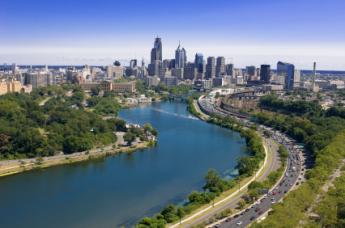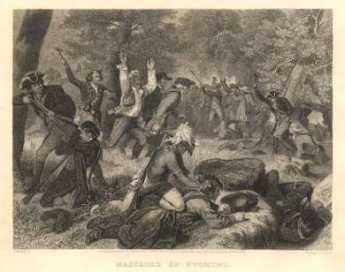Related Topics
Philadelphia, A Running Commentary
A series of observations in and around Philadelphia by notables over the last three and one-half centuries.

Bystanders to the Revolution
It wasn't heroic to everyone.
Revolutionary Philadelphia's Loyalists
History is written by the victors, so the Tory Loyalists of Revolutionary Philadelphia have mostly fallen from view.
Favorite Reflections
 In no particular order, here are the author's own favorites.
In no particular order, here are the author's own favorites.
Montgomery and Bucks Counties
The Philadelphia metropolitan region has five Pennsylvania counties, four New Jersey counties, one northern county in the state of Delaware. Here are the four Pennsylvania suburban ones.
Pacifist Pennsylvania, Invaded Many Times
Pennsylvania was founded as a pacifist utopia, and currently regards itself as protected by vast oceans. But Pennsylvania has been seriously invaded at least six times.
Military Philadelphia
.
The Pennamite Wars
The Connecticut farmers believed the King's last word overturned all earlier ones, else why be a king? William Penn's revolutionary idea was that of private property -- the first sale created a new owner, whose new word erased any earlier ones. When you acquire a new continent from aborigines, that's a congenial viewpoint.
The Wyoming Massacre of July 3, 1778

|
|
The Wyoming Massacre
|
The six nations of Iroquois dominated Northeastern America by the same means the Incas dominated Peru -- commanding the headwaters of several rivers, the Hudson, the Delaware, and the Susquehanna, as well as the long finger lakes of New York, leading like rivers toward Lakes Ontario and Erie. They were thus able to strike quickly by canoe over a large territory. Iroquois were quite loyal to the British because of the efforts of Sir William Johnson, who settled among them and helped them advance to quite a sophisticated civilization. It even seems likely that another fifty years of peace would have brought them to an approximately western level of culture. Aside from Johnson, who was treated as almost a God, their leader was a Dartmouth graduate named Brant.
Brant, The Noble Savage
The mixed nature of the Iroquois is illustrated by the fact, on the one hand, that Sachem Brant translated the Bible into Mohawk and traveled in England raising money for his church. On the other hand, his biographers trouble to praise him for never killing women and children with his own hands. British loyalty to these fierce but promising pupils was one of the main reasons for the 1768 proclamation forbidding colonist settlement to the West of what we now call the Appalachian Trail, which on the other hand was itself one of the main grievances of the rebellious land-speculating colonists. The Indians, for their part, saw the proclamation line as their last hope for survival. After Burgoyne's defeat at Saratoga, the Indian allies were free to, and probably urged to, attack Wyoming Valley.
It is now politically incorrect to dwell on Indian massacres, but this one was both exceptionally savage, and very close to home. The Iroquois set about systematically exterminating the rather large Connecticut sub-colony and came pretty close to doing so. Children were thrown into bonfires, women were systematically scalped and butchered. The common soldiers who survived were forced to lie on a flat rock while Queen Esther, "a squaw of political prominence, passed around the circle singing a war-song and dashing out their brains." That was for common soldiers. The officers were singled out and shot in the thigh bone so they would be available to be tortured to death after the battle. The Wyoming Massacre was a hideous event, by any standard, and it went on for days afterward, as fugitives were hunted down and outlying settlements burned to the ground.
It's pretty hard to defend a massacre of this degree of savagery, but the Indians did have a point. They quite rightly saw that white settler penetration of the Proclamation Line would inevitably lead to more penetration, and eventually to the total loss of their homeland. The defeat of a whole British Army under Burgoyne showed them that they were all alone. It was do or die, now or never. Countless other civilizations have been extinguished by provoking a remorseless revenge in preference to a meek surrender.
Originally published: Tuesday, June 20, 2006; most-recently modified: Wednesday, May 22, 2019
| Posted by: Lorraine (Hopfer) Brelsford | May 31, 2017 10:38 PM |
| Posted by: Rosemary Rosenthal | Mar 27, 2017 2:53 AM |
| Posted by: B.B. | Jul 8, 2014 3:36 AM |
| Posted by: Paul K. Ingram | Feb 15, 2014 3:28 PM |
| Posted by: Mike Simmons | Oct 23, 2013 9:01 PM |
| Posted by: michael bielby | Oct 22, 2013 9:56 PM |
| Posted by: jerry | Oct 4, 2013 4:22 PM |
| Posted by: Mike Simmons | Oct 1, 2013 11:40 AM |
| Posted by: Jan | Dec 10, 2012 12:57 PM |
| Posted by: Bettyg | Nov 17, 2012 4:28 PM |
| Posted by: Carole Murphy | Jun 3, 2012 6:52 PM |
| Posted by: Mary Jane Miller | May 3, 2012 11:49 AM |
| Posted by: Jeffery MacBeth | Feb 24, 2012 5:58 PM |
| Posted by: Clan Wigton | Jan 9, 2012 5:00 AM |
| Posted by: andy lucas | May 21, 2011 6:23 AM |
| Posted by: A.Prebb. | May 20, 2011 3:36 AM |
| Posted by: ALH | Jan 26, 2011 3:57 PM |
| Posted by: Beth Benner | Sep 2, 2010 1:51 AM |
| Posted by: Beth Snyder | Jun 26, 2010 7:37 PM |
| Posted by: jadyn | May 19, 2010 3:07 PM |
| Posted by: [none] | Mar 4, 2010 8:37 PM |
| Posted by: name | Jan 4, 2010 1:12 PM |
| Posted by: Jeffrey Smith | Nov 13, 2009 2:32 PM |
| Posted by: dude | Apr 23, 2009 10:18 AM |
| Posted by: anomimis | Oct 12, 2008 1:16 PM |
| Posted by: psa | Mar 20, 2008 11:53 AM |

 In no particular order, here are the author's own favorites.
In no particular order, here are the author's own favorites.
